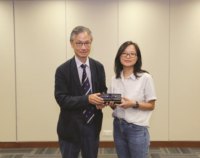Prof. Deng Yanhua (Ph.D., The Chinese University of Hong Kong) is a Professor of Sociology at Nanjing
University. Prof. Deng’s research centres on Political Sociology, Contentious Politics, and Environmental
Sociology. Her recent studies appear in The China Quarterly, The China Journal, Journal of Contemporary
China, Social Sciences in China, Sociological Studies, and Management World.
The Institute was honoured to invite Prof. Deng to deliver a public lecture on the theme of poverty alleviation actions in mainland China on 5 September afternoon at the Activity Room of Art Museum's east wing. The lecture was conducted in Mandarin and attended by 60 participants.
According to Prof. Deng, in many studies, several collective economic projects for poverty reduction have been recognized as “landscapes” primarily displaying symbolic impacts. However, these studies have failed to systematically investigate either generation mechanisms or the actual influence of these projects. In many impoverished areas, developing collective economies with growth potential in the short term proves challenging due to a combination of factors. The tight timeline set for the targeted poverty alleviation phase has accelerated the growth of the collective economy in some impoverished areas but also led to the creation of poverty reduction landscapes in areas with unfavourable development conditions. The assessment approaches to poverty reduction efforts exacerbate the latter. In many settings, collective economic projects for poverty reduction primarily serve as symbolic landscapes in response to general inspections by assessment teams or random inspections from higher authorities. Therefore, they can hardly be an effective driving force for rural development. |














